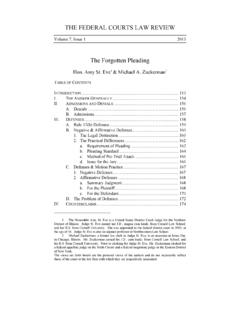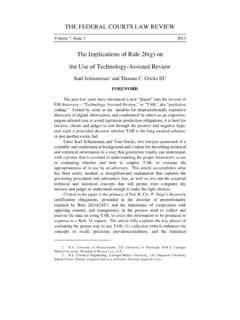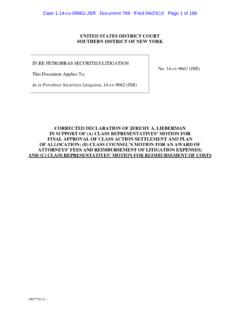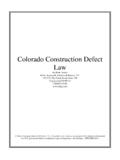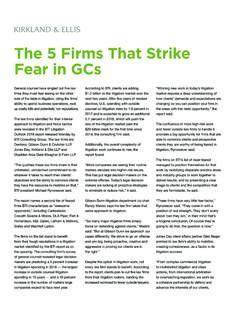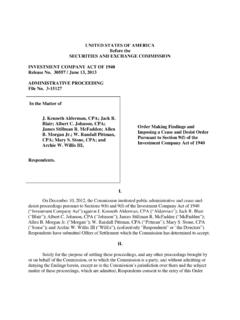Transcription of Asserting and Challenging Privilege Claims in Modern ...
1 FACCIOLA ARTICLE - DRAFT 11/13/2009 11:55:44 AM THE FEDERAL COURTS LAW REVIEW Volume 4, Issue 1 2009 Asserting and Challenging Privilege Claims in Modern litigation : The Facciola-Redgrave Framework Hon. John M. Facciola and Jonathan M. Redgrave1 ABSTRACT The volume of information produced by electronic discovery has made the process of reviewing that information, to ascertain whether any of it is privileged from disclosure, so expensive that the result of the lawsuit may be a function of who can afford it.
2 The volume also threatens the ability to accurately identify and describe relevant and privileged documents so that the system of Claims and adjudication teeters on the brink of effective failure. The authors submit that the majority of cases should reject the traditional document-by-document Privilege log in favor of a new approach that is premised on counsel s cooperation supervised by early, careful, and rigorous judicial involvement. That cooperation, having first led to an agreement as to what categories of information will be eliminated from any Privilege review because the information is so clearly not privileged or so clearly privileged, will then focus on categorization of the information that must be reviewed.
3 Claims of Privilege will then be made and, if challenged, initially assessed by the Facciola is a United States Magistrate Judge for the United States District Court for the District of Columbia. He is a member of the Board of Directors of the Federal Judicial Center and a former Editor in Chief of the Federal Courts Law Review, the electronic law journal of the Federal Magistrate Judges Association. Jonathan Redgrave is a partner with Nixon Peabody LLP in Washington, He chairs the firm s Information Law Advisors team and is Chair Emeritus of The Sedona Conference s Working Group on Best Practices for Electronic Document Retention and Production.
4 The views expressed in this article are solely those of the authors. The authors wish to acknowledge and thank the substantial contributions of Eric Buescher, Summer Associate at Nixon Peabody, to the preparation of this article. FACCIOLA ARTICLE - DRAFT 11/13/2009 11:55:44 AM 20 THE FEDERAL COURTS LAW REVIEW [Vol. 4 judge on a categorical basis where what is true of a sample from the category is true of the category.]
5 This process involves the formal and informal exchange of information to substantiate the categories, with the goal of eliminating many potential disputes. They then propose a requirement of a detailed description for the information withheld as privileged which remains subject to dispute so that the necessity of in camera review is reduced to a minimum. The preparation of this more detailed log for a narrowly targeted population will be more useful and, in effect, much less burdensome because the number of documents which must be logged has been reduced to a minimum.
6 The authors consistently emphasize the necessity for counsels cooperation, enforced by strong judicial control and how Federal Rule of Evidence (FRE) 502 can be used to craft a sound agreement incorporated in a court order that should provide protection against any loss of Privilege through waiver. Finally, conceding that their approach requires good faith and cooperation, they insist that firm judicial punishment of cheating and gamesmanship will, in the long run, create a new regime of Asserting Privilege that makes much more sense than the old one, which may soon collapse, in light of the ever-increasing amount of information that the Modern technological workplace is producing.
7 TABLE OF CONTENTS I. 22 II. 23 A. Rule 26 Prior to 1993, Local Rules and Individual 23 B. 1993 27 C. Subsequent Rule 28 D. Federal Rule of Evidence 29 III. PROBLEMS WITH Privilege LOGS AND THE IMPACT OF 31 IV. EXPONENTIAL PROBLEMS FOR Privilege Claims CAUSED BY ELECTRONICALLY STORED 36 A. 36 B. E-mail 38 C. 39 V. WAY 40 A. Rules Based Authority for Framework 1993 and 2006 Amendments Along with FRE 40 B. Solutions from 41 FACCIOLA ARTICLE - DRAFT 11/13/2009 11:55:44 AM 2009] The Facciola-Redgrave Framework 21 1.
8 In re Vioxx Products Liabilities 41 2. D Onofrio v. SFX Sports 43 C. The Facciola-Redgrave 44 1. Rule 26(f) Meet and Confer on Privilege 44 2. Use of Categories, Indices, and Privilege 45 A. Categories of 45 B. Segregating, Categorizing, Indexing, and Logging Privileged 45 1. Segregation of Presumptively Privileged 45 2. 46 3. Objective 46 4. Privilege 47 C. Evidentiary Support for 47 D. Meet and Confers Regarding Rolling Categorization, Indexing, and/or 47 E. Rolling 48 F. Rolling Indexing and Privilege Log 48 1.
9 Limited 48 2. Readily Available Objective Information for 48 3. Additional Information Required for Privilege 48 4. E-Mail Strings (for both Indices and Privilege Logs).. 49 5. 49 6. Duplicates and Near 49 3. Court Order Regarding 50 A. Challenges to and Rulings on Privilege 50 B. Dealing with Uncooperative Counsel and Cheaters .. 52 VI. 53 If, indeed, the common law of Privilege is not frozen in antiquity, but rather is flexible and adaptable to changing circumstances, then it must be elastic enough to permit reasonable measures to facilitate production of voluminous electronically stored information during discovery without imposing on the parties unreasonable burdens on their human and fiscal resources.
10 The unavoidable truth is that it is no longer remarkable that electronic document discovery may encompass hundreds of thousands, if not millions, of electronic records.. In this environment, to insist in every case upon old world record-by-record pre-production Privilege review, on pain of subject matter waiver, would impose upon parties costs of production that bear no proportionality to what is at stake in the litigation , and mark a dramatic retreat from the commendable FACCIOLA ARTICLE - DRAFT 11/13/2009 11:55.


